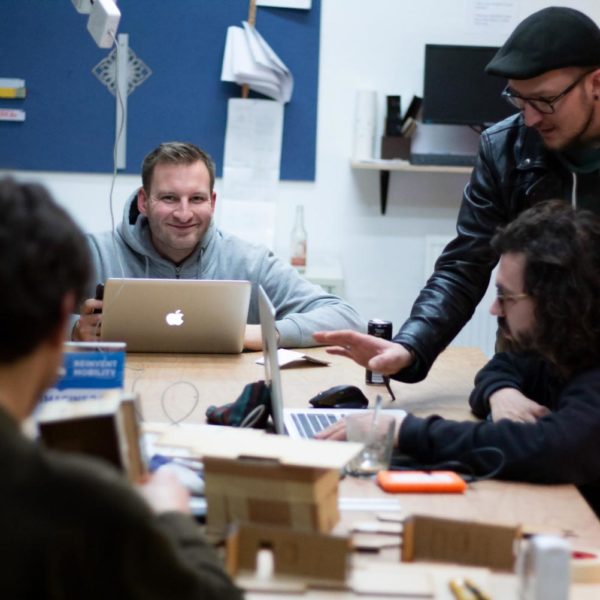How to: Legal Foundation for Hardtech Startups
6 TIPS FOR BUILDING A LEGAL FOUNDATION FOR HARDTECH STARTUPS
Founding a startup is an exciting endeavour, but it requires careful planning, consideration and also managing all important legal aspects right from the start, which can cause a lot of stress. These are the 6 most important tips and insights from our expert and lawyer Louis Meyer.
Founding a startup is an exciting endeavour, but it requires careful planning, consideration and also managing all important legal aspects right from the start. These are the 6 most important tips from our expert and lawyer Louis Meyer.
Founding a hardtech startup is an exciting endeavour, but it requires careful planning and consideration to ensure its long-term success. From product design & development, to finding your customers and the right investors, it also requires hard work and persistence! An additional part that you often don’t hear about is how complex and exhausting it is to manage the legal aspects.
That’s why we asked Louis Meyer from Lambsdorff to share 6 valuable tips to help you establish a solid legal foundation for your startup.
Lambsdorff is a commercial law firm based in Berlin.
INCORPORATE YOUR BUSINESS EARLY
Taxation, complex legal mechanisms in financing rounds and a lack of corporate structures in your hardtech startup can lead to problems sooner than you think. Avoid it!
Taxation, complex legal mechanisms in financing rounds and a lack of corporate structures can lead to problems sooner than you think. Avoid it!
Starting your venture as an informally initiated business or partnership and converting it into an UG or GmbH at a later stage may not be tax-neutral, as this could potentially lead to unexpected tax effects. It is therefore advisable to incorporate your joint enterprise as an UG or GmbH before creating significant value.
By incorporating your business early, you avoid establishing complex legal mechanisms during financing rounds that become more challenging and time-consuming without the proper corporate structure of your hardtech startup in place.



CLARIFY EXPECTATIONS WITHIN THE FOUNDING TEAM OF YOUR HARDTECH STARTUP
Misaligned expectations can lead to disruptive changes within the founding team.
Misaligned expectations can lead to disruptive changes within the founding team.
Those misaligned expectations within the founding team of hardtech startups often require substantial effort and expenses to adapt, when they lead to disruptive changes in the team. Clearly communicate and align expectations regarding contributions and commitments from each cofounder from the beginning.
Addressing divergent expectations at an early stage will minimise the risk of disruptive changes and also give you a favourable impression with investors when you’re fundraising.
HANDLE OFF-BOARDINGS AND STAKE ADJUSTMENTS WITHIN YOUR HARDTECH STARTUP WITH CARE
Parting ways with cofounders or making stake adjustments at a later stage can be challenging and costly. These situations will often incur additional advisory costs and may affect the overall stability and focus of the hardtech startup and company. Address these matters upfront and seek expert advice when needed to avoid potential friction and complexities.


SECURE COFOUNDERS' EQUITY BEFORE VALUE CREATION
When it comes to equity, bringing in cofounders at a later stage can have negative tax implications. The onboarded cofounders are very often limited to virtual shares as issuing actual equity may not be tax-neutral. However, virtual shares are often considered less attractive because they fall within the scope of income tax and do not grant voting rights.
To avoid this, ensure that all cofounders hold their planned stake of equity in the hardtech startup before creating significant value.
BALANCE STAKES WITH CONTROL IN MIND
When determining cofounders’ equity stakes, consider the level of control each stakeholder will have over the hardtech company. Be cautious of 50/50 ownership splits that can lead to dead-lock situations. Instead, aim for a balanced distribution to maintain a healthy balance of control.
NEGOTIATE THE TERM SHEET THOROUGHLY
When raising funds for your hardtech startup from investors, prioritise comprehensive negotiations of the term sheet. The term sheet negotiation offers the strongest negotiation position for founders, allowing them to secure favourable terms and conditions.
Don’t delay addressing key points until the long-form agreements, as time constraints and cost pressures can ruin your leverage.
SO WHAT´S THE BOTTOM LINE?
Raising startup capital and establishing a solid legal foundation require careful planning and strategic execution also for hardtech startups.
Raising startup capital and establishing a solid legal foundation require careful planning and strategic execution also for hardtech startups.

By considering and implementing these 6 tips, you can navigate some significant complexities associated with incorporation, cofounder relationships, stake adjustments, tax efficiency, control dynamics, and fundraising negotiations more effectively.
These proactive measures will help establish a solid foundation for your startup’s growth and increase your chances of success in the long run.
By considering and implementing these 6 tips, you can navigate some significant complexities associated with incorporation, cofounder relationships, stake adjustments, tax efficiency, control dynamics, and fundraising negotiations more effectively.
These proactive measures will help establish a solid foundation for your startup’s growth and increase your chances of success in the long run.


